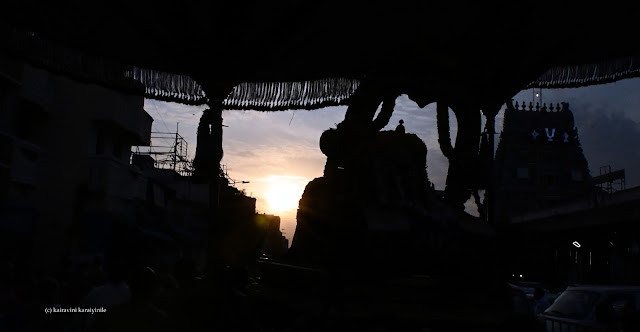Perhaps in our mundane or busy routine, we miss out to enjoy ‘spectacular
happenings’ - Sun rise and Sun set are such phenomenon that
are so enjoyable – though people living in Chennai can enjoy it so well, not
many of us enjoy nature. While a
Spectacle is - something exhibited to view as unusual, notable, or entertaining,
especially, an eye-catching or dramatic
public display – Spectacles would mean eye glasses.
Sunset (or sundown) is the disappearance of the Sun below the horizon of the Earth (or any other astronomical object in the Solar System) due to its rotation. As viewed from everywhere on Earth, it is a phenomenon that happens approximately once every 24 hours, except in areas close to the poles. At sunrise and sunset, the Sun is very low in the sky, which means that the sunlight we see has travelled through a much thicker amount of atmosphere. Because blue light is scattered more strongly by the atmosphere, it tends to be scattered several times and deflected away in other directions before it gets to us. This means that there is relatively more yellow and red light left for us to see.
Though we can see and enjoy them almost daily with exception of misty, rainy days, at the poles, the sun only rises and falls once a year. This one sunrise and sunset are known as the summer and winter equinox. During the polar spring, the sun rises and continues to do so until it reaches its peak in summer. The polar autumn is a time of twilight, when the sun stays just below the horizon and creates an ambient glow. Once winter arrives, there is permanent darkness.
It is Sunset – the dusk. The time of
dusk is the moment at the very end of astronomical twilight, just before the
minimum brightness of the night sky sets in, or may be thought of as the
darkest part of evening twilight. Sunset is the moment when the sun disappears
below the horizon. It marks the end of the day and the beginning of twilight. Dusk
refers to the period of time that follows sunset, during which the sky
gradually darkens. In summary, sunset is
a specific point in time, while dusk is the period that follows it.
During sunrise and sunset, the sky appears red while during the day, it appears blue. The most basic answer is that light is refracted by particles in the atmosphere and the red end of the spectrum is what is visible. To better understand that you have to have a basic understanding of how light behaves in the air, the atmosphere’s composition, the color of light, wavelengths, and Rayleigh scattering and here is all of the information that you need to understand those things.
The Earth’s atmosphere is one of the main factors in determining what color a sunset is. The atmosphere is made up mostly of gases with a few other molecules thrown in. Since it completely surrounds the Earth it affects what you see in every direction. The most common gasses in our atmosphere are nitrogen(78%) and oxygen(21%). The remaining single percent is made up of trace gasses, like argon, and water vapor and many small solid particles, like dust, soot and ashes, pollen, and salt from the oceans. There may be more water in the air after a rainstorm, or near the ocean. Volcanoes can put large amounts of dust particles high into the atmosphere. Pollution can add different gases or dust and soot.
Next, you have to look at light waves and the color of light. Light is an energy that travels in waves. Light is a wave of vibrating electric and magnetic fields and is a part of the electromagnetic spectrum. A wavelength is the distance between the tops of the waves. The frequency is the number of waves that pass by each second. The longer the wavelength of the light, the lower the frequency, and the less energy it contains. Visible light is the part of the electromagnetic spectrum that our eyes can see. Light from a light bulb or the Sun may look white, but it is actually a combination of many colors. Light can be split into its different colors with a prism. A rainbow is a natural prism effect.
Light moves in a straight line until it is interfered with(gas molecule, dust, or anything else. At sunset, light must travel farther through the atmosphere before it gets to you, so more of it is reflected and scattered and the sun appears dimmer. The color of the sun itself appears to change, first to orange and then to red because even more of the short wavelength blues and greens are now scattered and only the longer wavelengths(reds, oranges) are left to be seen.
The
setting of sun is not good medically. Setting
sun eyes, also called “sunset eyes” or “setting sun sign,” refers to a
phenomenon in infants and young children in which the eyes are focused
downward, and the upward gaze is inhibited. Hydrocephalus is a condition in which an
accumulation of cerebrospinal fluid (CSF) occurs within the brain. This typically causes increased pressure
inside the skull. Older people may have headaches, double vision, poor balance,
urinary incontinence, personality changes, or mental impairment. In babies, it
may be seen as a rapid increase in head size.
adiyen Srinivasa dhasan
Mamandur Veeravalli Srinivasan Sampathkumar


.jpg)



The Sunset silhouettes are too Good. You may like to frame paintable scenes. Think of an artist when you take photos!!
ReplyDelete